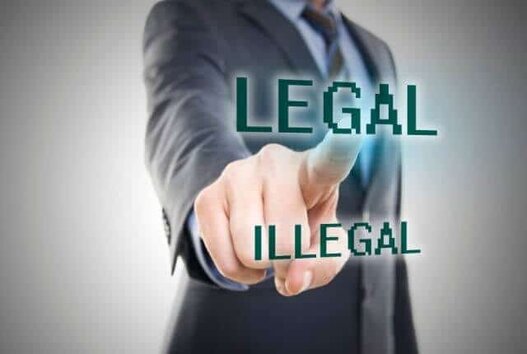
Dropshipping is a retail e-commerce fulfillment method that allows retailers to sell products without retaining any physical inventory on hand. But is dropshipping illegal? We will find out in this guide and discuss the possible dropshipping legal requirements.
Dropshipping is when a merchant sells a product to a consumer and then passes the order on to a third-party supplier, who ships the product straight to the customer on the retailer's behalf.
Instead of having to handle the logistics aspects yourself such as purchasing inventory, storage, packaging, and shipping the products out every time an order comes in, dropshipping allows you to sell products that your wholesale supplier or manufacturer sells.
Rather than buying inventory, stocking it, then packaging and shipping it out every time an order comes in, dropshipping allows you to sell products that your manufacturer or a wholesaler houses. They keep it until you're ready to sell it. You don't have to pay anything until it sells.
There are numerous advantages here. For starters, you won't have to invest money in inventory. Instead, when an order comes in, you buy things from the manufacturer or distributor.
In this situation, your risks are significantly reduced because you already have the funds to complete the transaction, so you place an order with your supplier who will ship the item directly to your customer. Therefore, you avoid problems linked to unsold inventory, reducing your risk.
Dropshipping Legal Requirements

When you ask yourself “is dropshipping illegal?”, you want to know the drop shipping legal requirements. The only legal paperwork that you would need to obtain for a dropshipping business is a tax ID (EID). In the United States, a tax ID is known by different names in different states, but the purpose is the same.
In general, actual wholesaler suppliers do not charge any tax on the products they supply to your customers to you, the dropship wholesale reseller. They must show the IRS why they did not charge you that tax at the end of the year.
Dropshipping with AliExpress
If you plan to do dropshipping with AliExpress, the marketplace mentions that according to the law of America states, for orders to be shipped to any state, they are subjected to sales tax, including state tax and country/city sales tax.
Indeed, Aliexpress is required by law to collect state tax and remit it to the local tax authority. For many states, the store owner has to request tax returns to Aliexpress manually, and for buyers from the US and AU, please follow the existing process to request tax returns manually.
AliExpress specifies that “there will be a new online function for business-type accounts to update VAT information, as business-type accounts might be excluded if VAT information can be verified”.
Your “Business Sales Tax ID number” demonstrates that you are collecting sales tax on goods dispatched to an address in the state where you are located (but check with your form for their current tax rules). This tax rate can be calculated and tracked automatically in your store or marketplace.
The Wholesale Supplier retains a copy of your “Business Sales Tax ID number” on file, so they are not responsible for the tax on the products they send to your clients.
Depending on how much you make and how liable you want to be, you can choose to go into LLC or sole proprietorship.
- LLC, you are protected if you run out of funds. However, it does cost money to set up.
- Sole proprietorship, you are responsible for everything, but it's fast and easy, and no paperwork to set up.
Is Dropshipping Legal?

Many people are wondering, “is drop shipping illegal?”. Dropshipping is legal. It's a straightforward form of online order fulfillment that allows retailers to focus on sales while a third-party provider manages goods delivery to customers.
Dropshipping is a very common method of selling. It is used by nearly every significant retailer, including an online giant, to fulfill client purchases. However, a few dropshipping practices are illegal and can get you and your business in trouble.
That's why it's essential to ensure that dropshipping is incorporated into your business model the right way so you can avoid any drop shipping legal issues.
Prevention is better than cure, and if you've been asking yourself “is dropshipping legal?”, you are conscientious and you want to follow the law, which you have to. The following dropshipping blunders are unlawful and can severely harm your business if you do them.
There are no laws or government policies in place that render the enterprise illegal in any area. Only recently has dropshipping been controlled. You must follow the rules and regulations set forth by the dropshipping platform you choose.
Dropshipping is encouraged by e-commerce platforms like eBay and AliExpress since it expands their consumer base. Dropshipping is a lucrative business. Despite this, many people hold misconceptions about it.
The following are some of the most heinous acts that have led to misunderstandings. In addition, the essay's next section will address some often-asked questions by suppliers:
- Stores are being banned.
- Management of Dropshipping Taxes
- Selling counterfeit products
- Have licenses and trademark
- Failure to respond to consumers
Some sellers' apprehensions are understandable. If you operate with a low-quality wholesaler, you'll run into these issues all the time, especially on the Internet. The rising uncontrollable aspects are the cause of many people's misunderstanding of the dropshipping industry.
Is Dropshipping Illegal?
To the question “is dropshipping illegal?”, the answer is straightforward, it is NO; dropshipping is not illegal. But it's also not that simple to operate and you have to know all the drop shipping legal requirements.
Legal Challenges in Dropshipping
You were wondering: is drop shipping illegal? Now you know that dropshipping is legal. However, specific areas in the dropshipping business can cause legal challenges if you do not handle them with care. They include:
Licenses and Trademark

Trademarked and copyrighted products are examples of intellectual property sales that will result in a slew of legal ramifications. Products in this category are linked to well-known sports teams and businesses and pop culture and fashion. These types of items should be avoided at all costs.
Before engaging in any e-commerce operation, such as dropshipping, certain countries require that you have a license or registration certificate. A fine may be imposed if these terms are not followed. To avoid any infringements, you must abide by all applicable copyright laws.
Avoid claiming that trademarked products are your original inventions if you work with them. If you deal in trademarked products, don't claim that they're your original creations. If you're serious about dropshipping, it's best to go private label.
Tax Administration

Online enterprises are taxed in some nations. Before you begin, you must understand the tax implications of e-commerce ventures in your country. You'll utilize this information to stay tax compliant and prevent problems with taxation authorities. You could face large fines or perhaps a prison sentence if you engage in tax evasion.
Once you have gained information about the taxing systems, make sure you satisfy all of your tax liabilities to prevent these consequences. Pay great attention to the requirements for both domestic and foreign businesses.
Buying and Selling Fake Goods

In all areas, dealing with counterfeit goods is prohibited. Those who distribute them face harsh punishments and lengthy prison sentences. Because you are not in contact with the counterfeit goods, suppliers can trick you into selling them.
Counterfeits and replicas are made to resemble the original product as closely as possible, with minor differences such as the absence of the original logo and a significantly reduced price. Customers unaware of the scam may fall for it and purchase counterfeit goods, which can generate a slew of problems for an e-commerce business.
Selling these types of products exposes you to a slew of legal bills, lawsuits, and infringement claims, as well as the possibility of having your online store shut down.
If you want to create an excellent dropshipping business, search for products unique to a customer audience, find a way to introduce clients to the products you're offering, and form a customer-friendly relationship.
You must be very careful to guarantee that the seller you chose will provide original goods and not cause you any trouble. Make sure they have all of the required quality assurance certifications.
Untrustworthy Vendors

The deal you make with buyers is legally binding. You must follow the contract's conditions to the letter. Customers will voice their concerns with you if your provider fails to deliver according to your specifications. Some customers may choose to cancel orders and request a refund.
Some may sue you for breaching the terms of your contract. Such inconveniences will only disrupt your operations and lead to financial losses.
Legal Risks associated with Selling Dangerous Products

When products are sold to the public at large, they must be safe. If the items are not secure and result in death, injury, or property damage, the manufacturer, retailer, or anybody else in the logistics chain may be held liable.
The law outlines who is responsible for any damage caused, including the producer, anybody who puts their name or trademark on the goods, importers, and anyone else in the supply chain who cannot determine where the product originated.
Consumer Protection Act in the UK
The Consumer Protection Act of 1987 addresses both civil and criminal issues of product safety. This guidance exclusively addresses the Act's civil features (i.e., the possibility of a compensation claim), which are frequently referred to as “product responsibility.”
Your local trading standards service can provide you with information on the Act's criminal components as well as the specifics of the many product-specific rules.
When a product is unsafe, consumers may be able to file claims for negligence or breach of contract in addition to claims under the Act.
Is dropshipping illegal? Legal risks of dropshipping
Please note that if you are dropshipping with a supplier located in China – for example with AliExpress – it is in practice almost impossible to sue your supplier.
In the event of an accident with the product you are selling, you will be held accountable. That is why we advise you to sell the safest products possible meeting international safety standards (CE, RoHS,…). In the US, you can refer to the website of the Consumer Product Safety Commission.
You should also register your business and get a tax ID, preferably as a company (moral entity LLC) to minimize the risk of personal responsibility in the event of injury or death caused by your product.
Pros of Dropshipping

- Low entry hurdles and restrictions
- It can be started with little money and no inventory, and it can be run from anywhere on the planet with only an internet connection.
- There's no need to worry about warehousing or inventory.
- Setting up a dropshipping store does not necessitate any technological knowledge.
FAQ – Is Dropshipping Illegal?
Is dropshipping branded merchandise legal?
Dropshipping of branded merchandise is not permitted. It is, at the very least, illegal to do so without the brand's authorization. While AliExpress may have products from Nike, Disney, Adidas, Star Wars, and other companies/trademarks, that doesn't imply you can sell them on your own online store.
The AliExpress vendors aren't technically permitted to sell them either. AliExpress is a marketplace with individual sellers headquartered in China; therefore, brand attorneys are unlikely to pursue it.
When you start dropshipping these things, this isn't the case. Dropshipping this thing to European or North American nations exposes you to legal action from these corporations. These businesses will sue you for every penny you've made using their trademarks, copyright, and other means.
Dropshipping branded merchandise is not a good idea.
How do I get permission from brands to drop ship their products?
You'll need authorization from the brand in writing. This information can only be obtained by communicating with them directly. It's worth noting, though, that a large corporation is unlikely to let an individual dropship their goods.
How do I set up my Privacy Policy?
A template feature built into your e-commerce platform's legal pages can help you create your privacy policy.
Is dropshipping illegal?
No, it's not illegal. Dropshipping is perfectly legal, it is just a fulfillment method in which you don't keep inventory. However, as with any business, you must obey the law and pay your taxes.
In addition, you have legal challenges related to the logistics model of dropshipping, such as liability in case of problems with products and your supplier, especially when based in China.
